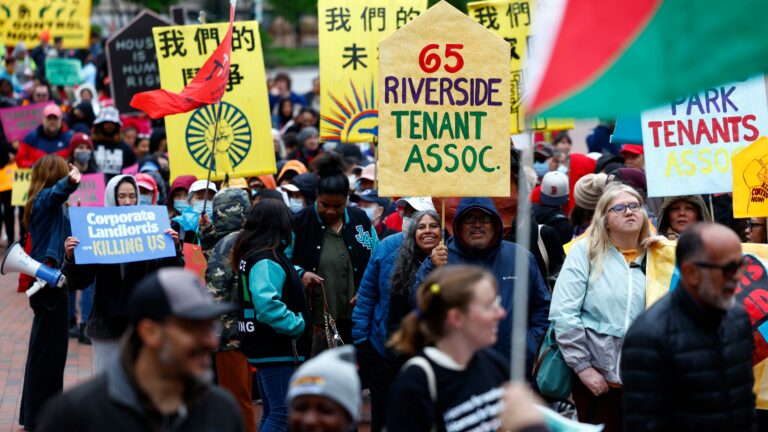Fall House Hunt
Tenant support organizations help navigate the system when apartments aren’t up to snuff.

Ideally, the relationship between a tenant and a landlord is a simple but vital one, in which suitable housing is exchanged for timely rent. But understanding how to navigate complications if and when they arise can be a difficult and confusing process, especially for new renters.
This fall, there are a few new legal updates supporting renters in Massachusetts, along with some important fundamentals to know.
With prices high and housing stock scarce, it isn’t easy to find an apartment to rent, and after the move-in process is complete, it can be easy to bypass other issues, such as problems with a unit’s condition.
“With all the excitement, we have to be aware that we have rights,” said Selena Eutsay, a Roxbury tenant organizer with City Life/Vida Urbana.
If it’s possible to do so before moving in, Eutsay urged new renters to inspect their apartments for functioning fixtures, appliances, working locks, gaps or holes that may invite pests, and working hot and cold water. Check for working outlets, broken blinds, and working smoke detectors, she added.
“You might just overlook it, because you see white paint and . . . shiny floors,” she cautioned.
If something seems off, bring it to the landlord’s attention.
“Feel free to say you don’t want to live in an environment like that,” she said.
Talking to the landlord should be the first order of business in ensuring an apartment is up to snuff, and Eutsay said that ideally, tenants and landlords can establish a positive rapport. But if a landlord is not responsive, seeking help from a tenant support organization could be the next step.
In the city of Boston, the Office of Housing Stability can be reached at 617-635-4200. City Life/Vida Urbana offers tenant support clinics and legal aid at its weekly meetings. The Greater Boston Tenants Union is another resource.
Renters may not always be aware of changes to legal rights. Hed Ehrlich, housing unit managing attorney for Greater Boston Legal Services, which focuses legal efforts on eviction defense, said one big change to note this year is the end of brokers’ fees.
“No holding fees, no application fees, no screening fees, no broker fees: all of that is illegal in Massachusetts,” he said. “The only things [tenants] can be charged are first, last, and the security deposit. The first month’s rent is a monthly rent. You can’t tell someone, for example, your monthly rent is $2,000 but for the first month it’s going to be $2,500, because this is just trying to fold in an application fee.”
If it can seem like a lot to retain, Ehrlich shared the Massachusetts Law Reform Institute’s updated guides for tenants online, including a “Before You Move In” overview, as well as information about tenant screening and a guide to navigating legal rights as a tenant. The guide provides detailed instructions for how to agree upon the condition of a unit in advance, and how to negotiate repairs if needed, along with other specifics related to leases, security deposits, and much more.
“The most important right is the right to organize,” said Matthew Barad, an organizer with the Greater Boston Tenants Union. “It is illegal to rent to a tenant to make them pay for an apartment that isn’t habitable.”
Barad said that as an organizer, the most common issue he sees in Boston is pests and mold, due to the age of the area’s housing stock, especially if it hasn’t been renovated.
“There’s not an official standard at which point [mold] becomes unsafe, so it’s hard to win an issue like that in the courts,” he said, “but it’s absolutely something tenants want to and do organize around, because it’s disgusting to live in a moldy apartment.”
Other common issues seen by the tenants union are harassment issues, frequent rent increases with or without unit improvements, slow responses to maintenance requests, leaks, and seasonally, faulty heating and air conditioning.
In a large building, tenants may have greater success negotiating improvements from a landlord by banding together to write a letter before any further escalation is necessary. But Barad pointed out that even in small buildings, neighbors may have more leverage than they realize.
For instance, many buildings are owned by LLCs, which can obscure the contact information of a building owner. But, he said, neighbors can use public online databases to search LLC ownership and learn from each other that one landlord owns multiple buildings in the neighborhood.
“When people stand together to make shared claims against bad conditions in their buildings, even if it’s just a few people, they can make a lot happen,” Barad said.
Sometimes conflicts escalate to eviction threats.
”Filing evictions is a strategy used by landlords, sometimes to push tenants out, and other times just to claim rent,” said Ian Spangler, another tenants union organizer.
Renters may receive a “notice to quit” letter from a landlord, indicating a tenant should vacate within a certain number of days. Eutsay said some tenants mistake that notification as a legal order to leave in that time frame, which it isn’t.
“Only a judge can evict you,” she said. “[The notice to quit letter] is a first step in them trying to scare you into leaving your unit. You do not have to leave. There’s a process.”
Eviction defense organizations can help tenants navigate the legal process and negotiate terms and time frames.
According to data from the Massachusetts Housing Partnership, there are between 3,000 and 3,500 monthly eviction filings in the state, about one-quarter of them filed for cause-based and no-fault evictions. (The rest are mostly classified as for nonpayment.)
The area’s high housing prices and low housing supply add strain to finding and staying in a rental. The housing partnership said in its June Housing Stability Monitor report the relatively high rate of evictions is evidence that state housing needs are not being met.
Barad acknowledged that eviction can be a frustrating process for a landlord, too, but that the balance of power leaves tenants in the toughest position. He said the worst thing a landlord might experience is that they — through some financial misfortune — become a tenant themselves, but for a tenant who loses an eviction case, their life can fall into ruin.
“They’re homeless on the street, they can lose their possessions, they can get any number of ailments‚” he said. “They can be unable to find housing in the future because they have an eviction on their record. I’m sympathetic to the human side . . . It’s frustrating to ever have to go to court, but what you stand to lose as a landlord is nothing compared to what the tenants in front of a housing judge stand to lose.”
An eviction filing in your renting history — regardless of type — can make it difficult to find a new apartment to rent. As of May in Massachusetts, those who have experienced eviction may petition to have their eviction records sealed. (Visit sealmyeviction.org.)
“It’s a great opportunity for people to start anew with at least this part of their life,” said Ehrlich. “You had a rough time in the past, but now you can move on. It really is removing barriers for very vulnerable people, and for everybody.”
Destabilization in the housing market can be a factor in the rise of conflict, said Ehrlich.
“This fall is a tight market, especially for low-income folks, but I think for everybody,” he said. “We need to build more, we need to protect people’s things and ability to stay where they are. We need to stabilize rents.”
Address Newsletter
Our weekly digest on buying, selling, and design, with expert advice and insider neighborhood knowledge.



